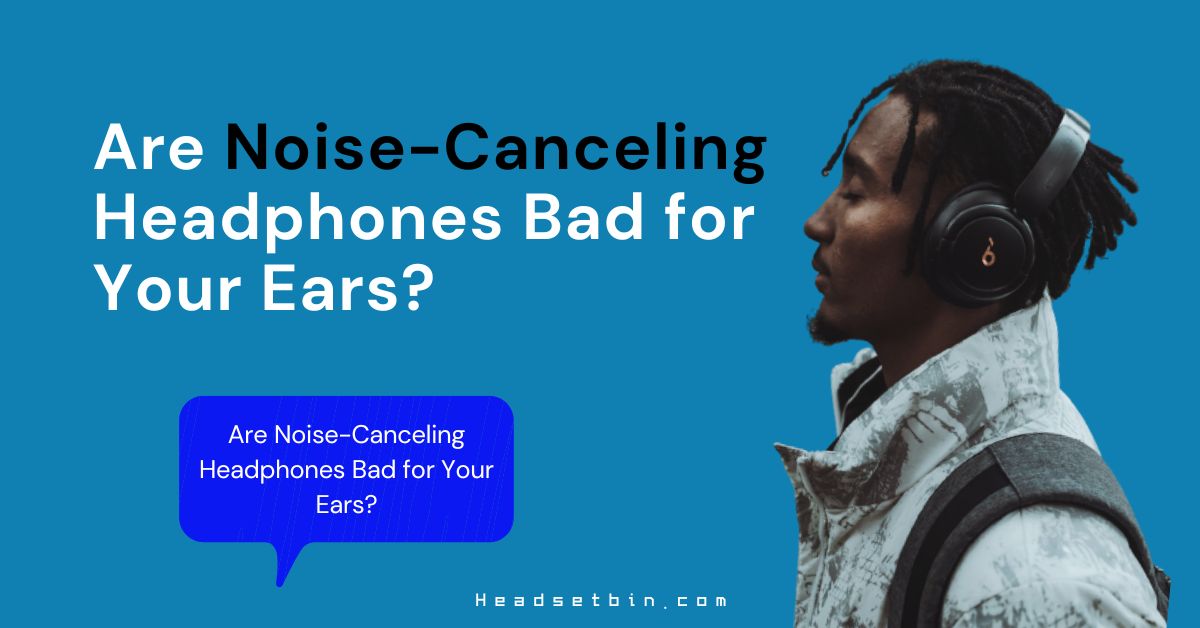Noise-canceling headphones are becoming increasingly popular, with consumers raving about their ability to block out external noise and create a more immersive listening experience. But before you rush out and buy a pair of these headphones, it’s important to understand that Are noise-canceling headphones bad for your ears. Plus what are the potential risks that come with using them?
In this article, we’ll take an in-depth look at the potential dangers of noise cancellation technology and help you decide if they’re right for you. We’ll also explore how Noise-Canceling Headphones work, their potential health benefits and risks, and how to use them safely. So if you’ve ever been curious about the science behind these devices, read on!
What are Noise-Canceling Headphones?
Noise-canceling headphones are designed to reduce the amount of background noise that you hear. By creating a sound wave, they cancel out surrounding noise. Noise-canceling headphones come in two main types:
Active Noise Canceling Headphones:
Active noise-canceling headphones use batteries to create a sound wave that cancels out background noise. That means it uses an external power to cancel out the noise. It is more functional than others.
Passive Noise Canceling Headphones:
Passive noise-canceling headphones do not use batteries, but they are not as effective at reducing background noise. It is cheap compared to ANC headphones.
Noise-canceling headphones can be beneficial if you often find yourself in noisy environments or if you have sensitive hearing. This gives you the best experience of calls, music, and other stuff. Most noise-canceling headphones are wireless, allowing you to enjoy your music without any wires.
How do Noise Canceling Headphones Work?
If you’re looking for a way to block out the world and focus on your music, noise-canceling headphones are a great option. But how do they work?
Noise-canceling headphones use a combination of active and passive noise reduction to minimize the amount of outside noise that reaches your ears.
Active noise cancellation uses electronic signals to create sound waves that cancel out specific frequencies of incoming noise. While Passive noise cancellation, on the other hand, relies on physical barriers, such as insulation and ear cups that fit snugly around your ears, to block out unwanted sound.
Noise-canceling headphones are most effective at canceling out low-frequency sounds, like the rumble of an airplane engine or the hum of traffic. They can also be helpful in reducing background chatter in busy offices or open spaces.
However, they aren’t perfect and won’t completely eliminate all noise. Additionally, some people find that they need to increase the volume of their music to compensate for the reduced sound quality caused by active noise cancellation.
If you’re considering noise-canceling headphones, it’s important to weigh the pros and cons before making a purchase. For many people, the benefits outweigh the downsides; however, it’s ultimately a personal decision.
Do Noise-Canceling Headphones Affect Hearing?

With noise-canceling headphones, you can hear your music or audio content more clearly due to their design. But some experts worry that these devices may actually be harmful to your hearing, mainly if you use them for long periods of time.
The research on this topic is inconclusive, so there is no definitive answer. Some studies have found that noise-canceling headphones can slightly reduce auditory function, while others have not found any significant effects. It is also worth noting that most of these studies have been conducted on animals, not humans.
So what does this all mean for you? If you’re worried about the potential effects of noise-canceling headphones on your hearing, there are a few things you can do to minimize any risks. First, make sure that you’re not using them at too high of a volume. Second, take breaks from using them every few hours to rest your ears. And finally, if you start to experience any hearing problems, be sure to see a doctor immediately.
Benefits of wearing Noise-Canceling Headphones:
There are many benefits to wearing noise-canceling headphones. Below are some of them:
Concentrate on Work:
One of the most apparent benefits is that they can help you concentrate and focus on your work, especially in a noisy environment.
Comfy Sleep:
Noise-canceling headphones can also help you get a better night’s sleep if you live in a loud area or have trouble sleeping due to noise.
Relieve Stress & Anxiety:
Additionally, they can help relieve stress and anxiety, and can even be used to help treat tinnitus.
Reduce Airplane Noise:
Noise-canceling headphones are great for use on airplanes, as they can help reduce engine noise and make the flight more pleasant.
Listen to Music Undisturbed:
Finally, they can be used to listen to music without any distractions or interference from outside noises.
The Potential Risks of Wearing Noise-Canceling Headphones:
Are noise-canceling headphones bad for your ears? So here is the detail of it. Noise-canceling headphones have been shown to increase the risk of hearing loss potentially. A study conducted by the National Institute for Occupational Safety and Health (NIOSH) found that workers who used noise-canceling headphones while working with machinery had an increased risk of developing Noise-Induced Hearing Loss (NIHL).
Warning Sound:
The study found that the use of noise-canceling headphones can actually make it harder for people to hear warning sounds, like a machine beeping or a co-worker shouting a warning.
Block Safety Sound:
In some cases, the use of noise-canceling headphones can actually block out these important safety sounds, which could lead to an accident.
In addition, hearing loss can be exacerbated by the use of earbuds and other headphones that are worn directly in the ear canal. If you must use these, keep the volume at a safe level and take regular breaks from listening.
If you must use noise-canceling headphones while working with machinery, it is essential to take breaks often and to keep the volume at a safe level. You should also make sure that you can still hear other people and warning sounds around you.
Tips for Safe Use of Noise-Canceling Headphones:
It is important to follow some basic safety tips when using noise-canceling headphones to protect your ears. Here are a few tips to keep in mind:
– Be aware of your surroundings and take breaks from using the noise canceling feature periodically to give your ears a rest.
– If you experience ringing in your ears or any other discomfort, stop using the headphones and consult a doctor.
– Keep the volume at a moderate level – too much noise can be damaging even with the noise canceling feature turned on.
– Avoid using noise-canceling headphones for prolonged periods of time. Give yourself breaks throughout the day to allow your ears to recover.
– When in public, be aware of your surroundings and use the noise canceling feature responsibly.
– Be aware of the fact that some sounds may not be canceled out completely by noise-canceling headphones.
Frequently Asked Questions:
Some mostly asked questions by noise-canceling headphones users are elaborated on below.
Q. Are noise-canceling headphones worth it?
Absolutely! Noise-canceling headphones are designed with comfort, audio quality, and ergonomics in mind. They not only reduce background noise but also allow you to enjoy music, podcasts, or any audio of your choice without distractions or interruptions. With all the advanced features that many models offer, noise-canceling headphones can be an invaluable asset when it comes to total immersion or peaceful listening.
Q. Do noise-canceling headphones damage your hearing?
Absolutely not! Noise-canceling headphones are designed to reduce the amount of background noise that you hear, not the sound of music or other audio. You can still enjoy your favorite tunes without worrying about hearing damage, as noise-canceling headphones use advanced technology to cancel out surrounding noise.
Q. Can noise-canceling headphones cause tinnitus?
No, noise-canceling headphones cannot cause tinnitus. While long-term exposure to loud sounds can be damaging to your hearing, noise-canceling headphones do not emit any sound of their own and therefore will not cause tinnitus.
Q. Do noise-canceling headphones protect hearing?
It depends on how long your exposure to the noise is and at what level. It’s important to pay attention to the volume of music you’re listening to and not expose yourself to loud noises for an extended period of time as this can be damaging to your hearing. We suggest using the ’80/80 rule’ which is setting the level at no more than 80 decibels and listening for no more than 80 minutes.
Q. Do noise-canceling headphones block out voices?
Yes, noise-canceling headphones are capable of blocking out voices and other low frequencies. The sound wave created by the headphones is able to block out these sound waves and reduce background noise significantly. So you won’t have to worry about hearing distracting conversations or any other low-frequency noises.
Q. Is it bad to wear noise-canceling headphones while sleeping?
It is not recommended to use noise-canceling headphones while sleeping as the soundwaves created can be disruptive to your sleep. If you are looking for a way to block out noise, try using relaxing and soothing music or use soundproof material in your room.
Q. Is There Any Benefit to Using Noise Cancelling Headphones?
Absolutely! Noise-canceling headphones offer several distinct benefits. First, they drastically reduce background noise, allowing you to focus on the sound coming through your headphones. Second, they improve audio clarity by allowing only the sound you want to hear—the music or podcast you’re listening to—to come through. Finally, they provide a more immersive listening experience for activities like gaming and movies.
Final Words:
As with any new technology, there are always some concerns about potential negative effects. In the case of noise-canceling headphones, there have been isolated reports of people experiencing headaches or dizziness after using them. However, it’s important to keep in mind that these side effects are rare and generally only affect a small percentage of users.
If you’re considering purchasing noise-canceling headphones, it’s a good idea to do your research and read reviews from other users. According to our research, Sony WH-1000XM5 and Bose QuietComfort are the best options for noise-canceling headphones. This will help you make an informed decision about whether or not they’re right for you.

